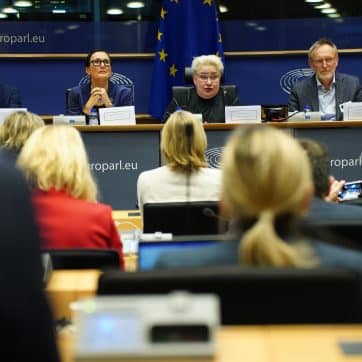
Our work in the EU
We are deeply committed to the transformation of 400+ cities, regions and countries in Europe and beyond into climate-resilient, carbon-neutral and ecologically sustainable places.
By 2030, with our support, these places will implement large-scale, integrated and transformative climate action. Their transformation not only has the potential to significantly reduce greenhouse gas emissions, but they will also serve as examples of healthy, equitable and thriving places to live, work and play.

Our mandate in Europe
EIT Climate-KIC is a key innovation partner for European climate policy. We use a systems approach to shape innovation to support EU Missions, Member States, cities and regions to deliver their climate ambitions.
Currently, we are a core delivery partner on three EU Missions – Climate-Neutral and Smart Cities Mission (NetZeroCities), Climate Adaptation Mission (Pathways2Resilience), and the Food and Soil Mission – and we participate in dozens of other Horizon Europe or European-based projects and programmes.
Under our new strategy, Transformation, with Urgency, in the next seven years, EIT Climate-KIC will continue to act to realise European climate, nature, social and industrial policy commitments in Europe and neighbouring countries, as well as support of European commitments to sustainable development and climate resilience outside of Europe.
European projects we currently participate in
Pathways2Resilience launches to accelerate climate adaptation in European regions
Learn moreEuropean Cities accelerating towards climate neutrality by 2030.
Learn moreClieNFarms is an Innovation Action project funded by the European Commission to support the European Green Deal.
Learn moreThe mission to establish 100 living labs and lighthouses to lead the transition towards healthy soils by 2030.
Learn moreBuilding a sustainable, inclusive, and aesthetically pleasing Europe.
Learn moreEurope's eyes on Earth, to better understand our planet and sustainably manage the environment we live in.
Learn more
Open calls
We work on transformative systemic change – change that encompasses regulation, governance structures, values, and mindsets. This involves working on many connected innovations in parallel to trigger a shift in the system.
To help reach a tipping point and create maximum impact, we offer grants, mobilise funds, and create collaboration opportunities and education programmes throughout the year.
Explore our Open calls to find your next opportunity.

Systems Transformation Hub
Connecting the EU with strategic and systematic guidance
The Systems Transformation Hub, a pioneering collaboration designed to drive systemic solutions for Europe, was launched in 2024 by a coalition of five thought-leading organisations, including EIT Climate-KIC, Metabolic, the Club of Rome, WRI Europe and Systemic.
It aims to provide strategic and systematic guidance, supporting the European institutions and Member States in policy analysis and development, policy learning, and agile decision support.
The Hub will focus on European policy and on Europe’s relationship with the rest of the world, developing a roadmap with policy orientations, to inspire the upcoming European Commission. The approach includes: modelling and research; crafting new, progressive narratives; and stakeholder consultation and communication.
The Hub will provide strategic capability for the EU, remaining independent, transparent, science-based and non-political.

